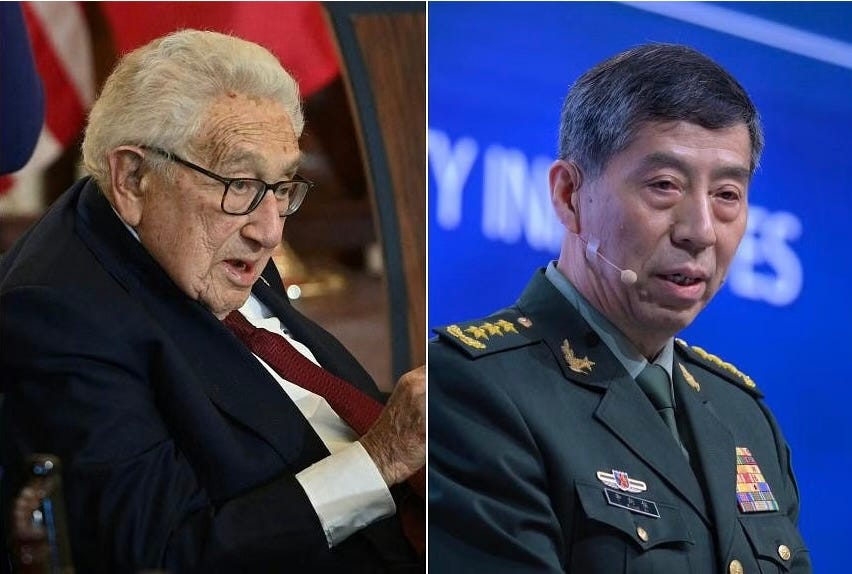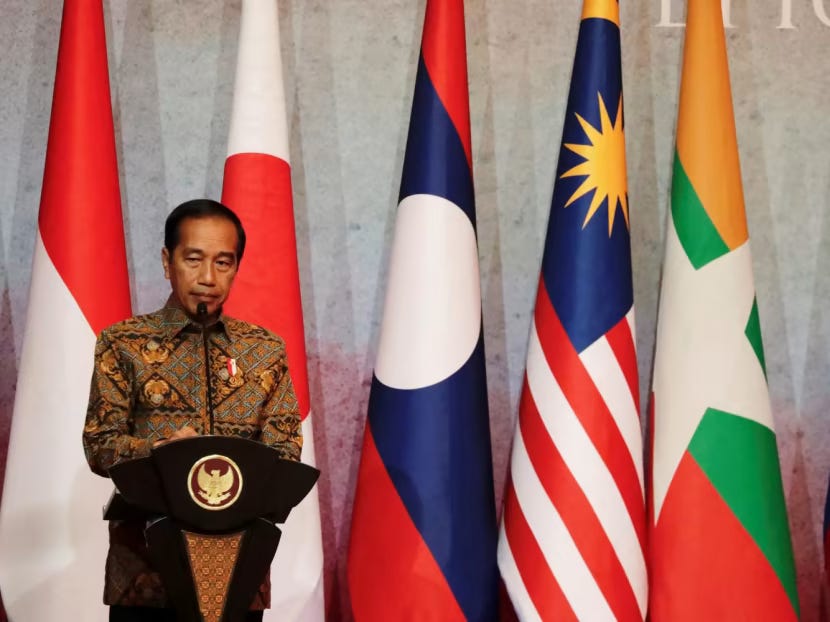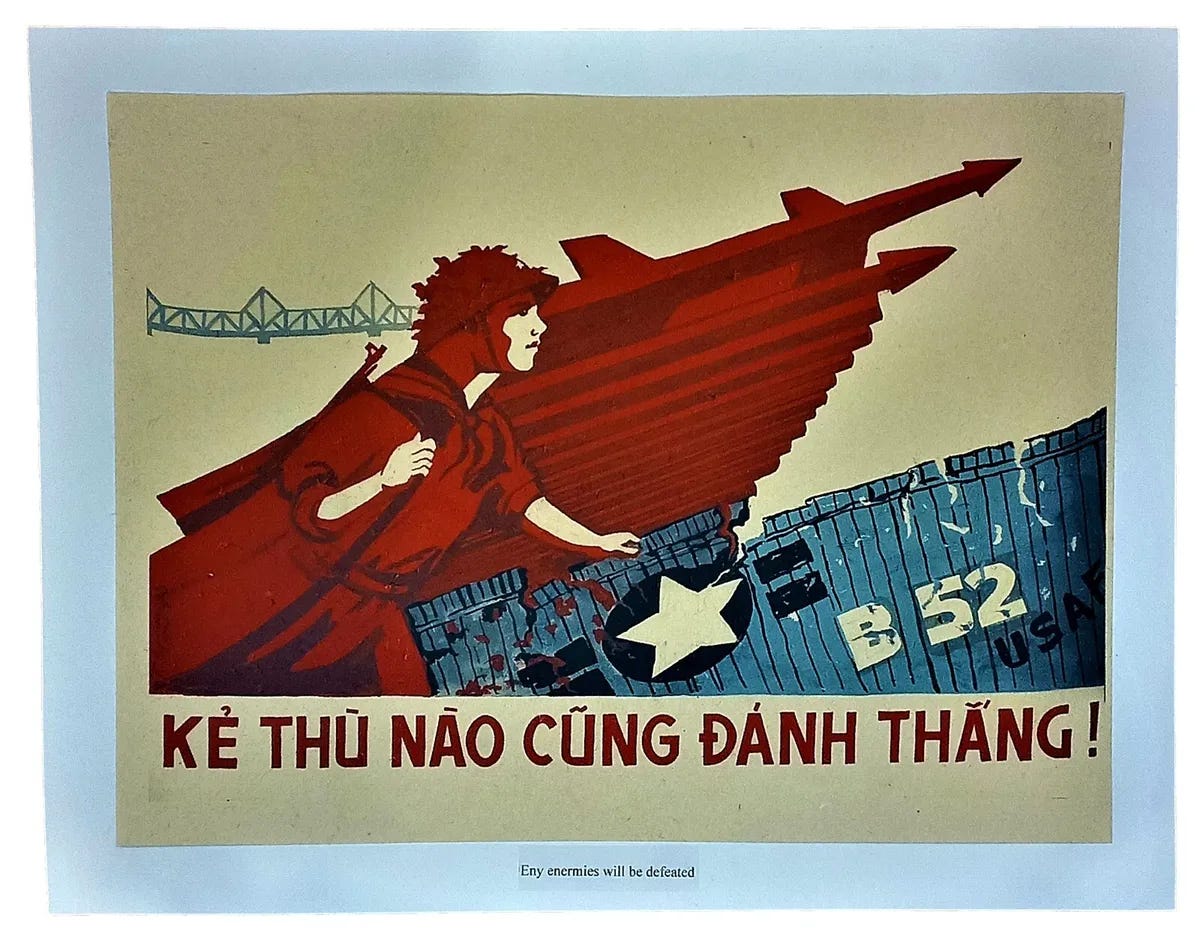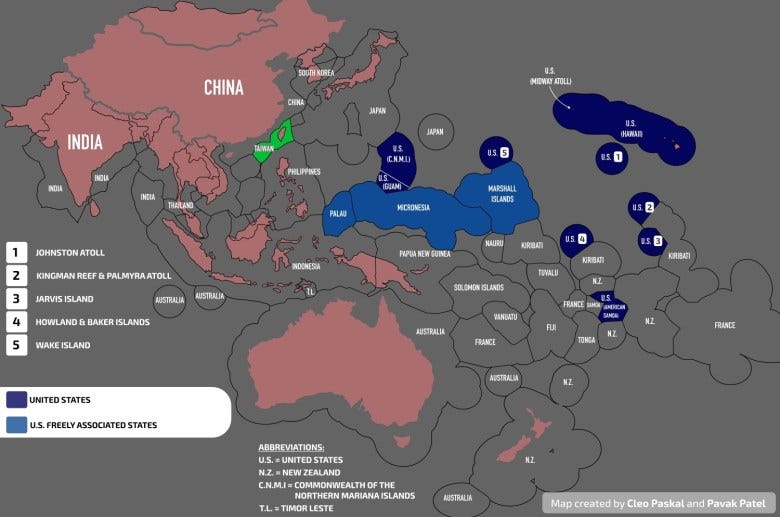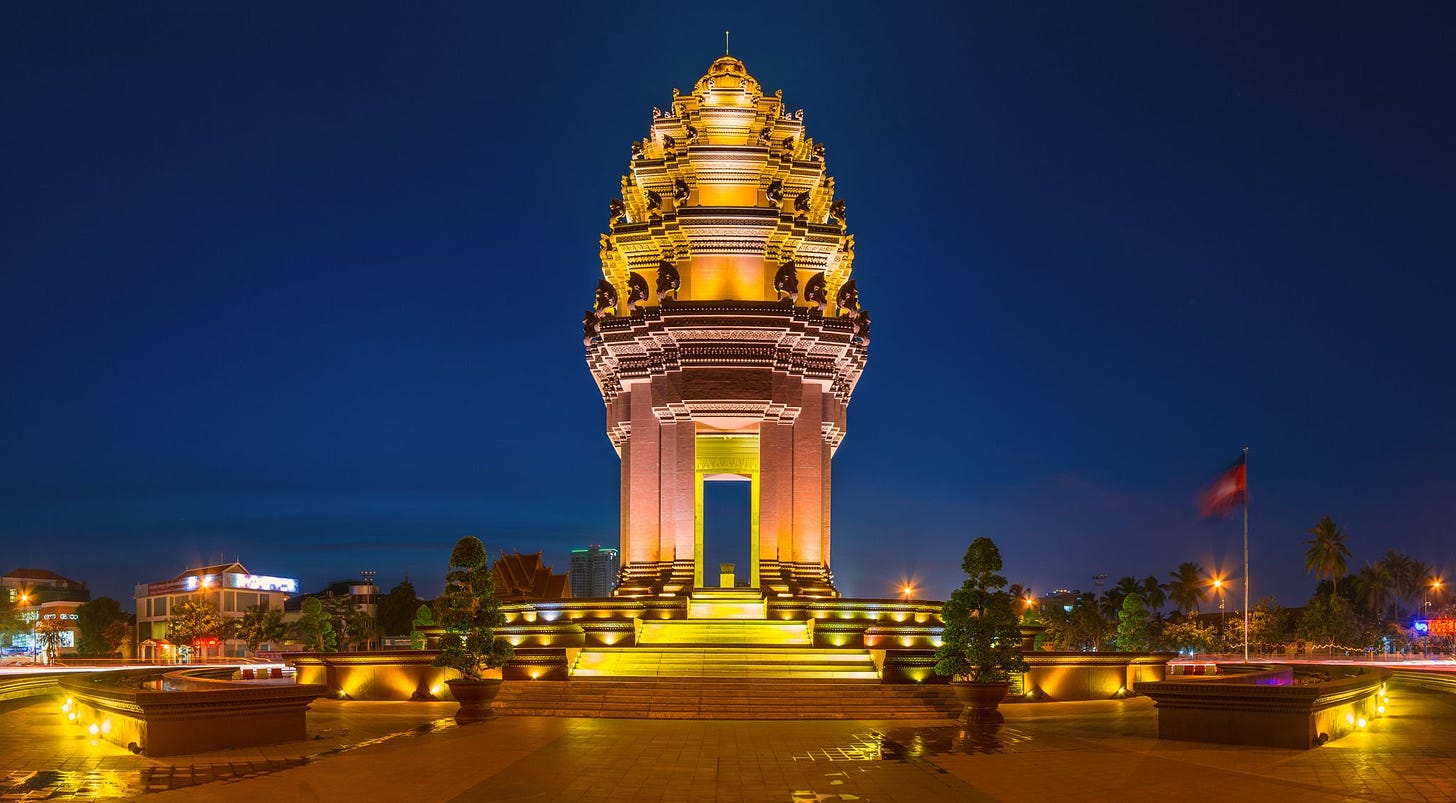Code and Verse
Kissinger meets Li Shangfu in Beijing, ASEAN advances Code of Conduct, Toxic Afterlife of US War in Vietnam, Micro States resist US Pacific pacts, What kind of freedom should each citizen use?
UPDATE: Ex-US secretary of state’s meeting with Li Shangfu comes amid hopes of improved ties between two countries. According to a readout on Tuesday from the Chinese defence ministry, Li Shangfu said “friendly communication” between China and the US had been “destroyed” because “some people in the United States did not meet China halfway”. Kissinger said he was a “friend of China”, according to the readout.
China and Southeast Asian nations agreed Thursday to conclude the long-delayed Code of Conduct (CoC) aimed at ensuring safe passage and joint exploitation of the South China Sea. During a meeting between the 10-nation bloc’s foreign ministers and China’s top diplomat Wang Yi in Jakarta to agreement was reached on guidelines to complete their code of conduct negotiations before fall 2026.
In the half-century since the withdrawal of the last U.S. troops from Vietnam. While the two former enemies have evolved their trade relationship, the scars from the long U.S. intervention in Vietnam remain, and each step toward normalisation have been shadowed by the continuing impacts of the U.S. Army’s intense aerial bombing and large-scale spraying of toxic chemicals over Vietnam, Cambodia and Laos.
Passing up the Pacific pacts would set the stage for US retreat in the Central Pacific. Three contiguous island nations – Republic of Palau, Federated States of Micronesia, and Republic of Marshall Islands – occupy an area about as large as the continental United States. They also make up a huge corridor in the middle of the Central Pacific, which is the backbone of the US “second island chain”.
In general, freedom refers to the ability to act or change something without a deterrent or a limited border. Something free if it can easily change and have no obstacles or impedes in its current state. In philosophy and religion, freedom is associated with free will and no excessive or improper obstruction or forced capture as a slave. In theory or in practice, one is free when he can do something that is not constrained by other forces.
Kissinger meets Li Shangfu in Beijing
By Amy Hawkins
Ex-US secretary of state’s meeting with Li Shangfu comes amid hopes of improved ties between two countries. According to a readout on Tuesday from the Chinese defence ministry, Li Shangfu said “friendly communication” between China and the US had been “destroyed” because “some people in the United States did not meet China halfway”. Kissinger said he was a “friend of China”, according to the readout.
“Neither the United States nor China can afford to treat the other as an adversary. If the two countries go to war, it will not lead to any meaningful results for the two peoples,” the Chinese statement reported Kissinger as saying.
The surprise visit of the 100-year-old former US secretary of state comes as John Kerry, the US climate envoy, is in Beijing to meet Chinese officials to discuss how the two countries can cooperate on confronting the climate crisis. Kerry is the latest in a string of senior US officials who have travelled to China this summer, after the US secretary of state, Antony Blinken, completed a long-awaited trip in June.
Relations between the two superpowers have been spiralling downwards for months, but there is cautious optimism on both sides that the restarting of official dialogues can build a foundation for improved ties.
Kissinger’s visit, which had not been publicised, is outside the official roster of meetings. It is almost exactly 52 years since his secret visit to Beijing in July 1971, which paved the way for Richard Nixon, the US president at the time, to normalise relations between the US and China. More than half a century on, Kissinger is still seen by many in Beijing as a “friend of China”. In May, state tabloid the Global Times praised Kissinger’s “razor-sharp” mind.
Kissinger has repeatedly warned of “catastrophic” consequences of a conflict between the US and China.
Li has been the subject of US sanctions since 2018, relating to the purchase of combat aircraft from Russia’s main arms exporter, which Beijing cites as a reason for refusing to reopen military-to-military dialogues with Washington. Last month, Li refused to meet his US counterpart, Lloyd Austin, at the Shangri-La Dialogue in Singapore.
ASEAN advances Code of Conduct
China and Southeast Asian nations agreed Thursday to conclude the long-delayed Code of Conduct (CoC) aimed at ensuring safe passage and joint exploitation of the South China Sea. During a meeting between the 10-nation bloc’s foreign ministers and China’s top diplomat Wang Yi in Jakarta to agreement was reached on guidelines to complete their code of conduct negotiations before fall 2026.
China and four of ASEAN’s member states — Brunei, Malaysia, the Philippines and Vietnam have been discussing the CoC for a decade. Slowing the CoC signing process is the constant interference of the United States and differences over undersea deposits of oil and gas, and fish stocks. A joint working group “should endeavour to conclude the negotiation of an effective and substantive code of conduct, in accordance with international law, including the 1982 U.N. Convention of the Law of the Sea, within a 3-year timeline or earlier,” according to the guidelines.
Chinese negotiators have proposed that the CoC restrict the presence and activities of foreign forces in the disputed waters. Southeast Asian diplomats have said that Washington cannot be restrained in its efforts to contain, suppress and encircle China and they fear US efforts to split the ASEAN bloc into maritime and terrestrial factions.
The guidelines called for more meetings between the two sides and the start of negotiations for the most contentious issues, including whether the regional code should be legally enforceable and its geographical scope. China and ASEAN signed a 2002 accord that called on rival claimant nations to avoid aggressive actions that could spark armed conflicts, including the occupation of barren islets and reefs, but violations have persisted.
The Editor
Toxic Afterlife of US War in Vietnam
George Black interviewed by Sebastian Strangio
The veteran writer talks about the “small group of thoughtful, committed citizens” that helped publicise the horrific legacies of the war – and foster reconciliation between two former enemies. In the half-century since the withdrawal of the last U.S. troops from Vietnam, the two former enemies have evolved into de facto strategic partners, driven together by shared concerns about the power of a rising China. But many of the scars from the long U.S. intervention in Vietnam remain, and each step toward normalization has been shadowed by the continuing impacts of the U.S. Army’s intense aerial bombing and large-scale spraying of toxic chemicals over southern Vietnam and southeastern Laos.
In his haunting new book “The Long Reckoning: A Story of War, Peace, and Redemption in Vietnam,” George Black tells the story of how, when most of the U.S. public and policymaking turned away from Vietnam in the aftermath of the U.S. withdrawal, a small group of people on both sides of the wartime divide managed to keep the horrific legacies of the war on the political agenda. Through sheer single-minded persistence, this group, which included scientists, pacifists, and two American veterans of the war, eventually forced the U.S. government to take responsibility for the ghastly impacts of its interventions in Vietnam, Cambodia, and Laos.
Black, a New York-based writer, who is also the author of seven previous books, spoke with The Diplomat about the genesis of the book, the nature of redemption, and how war legacies have factored into the burgeoning strategic relationship between Hanoi and Washington.
Let’s start by talking about what first got you interested in exploring the legacies – particularly the environmental aftereffects – of the U.S. war in Vietnam.
The title of my book, “The Long Reckoning,” comes from a letter Thomas Jefferson wrote in 1808: “The evils of war are great in their endurance, and have a long reckoning for ages to come.” I think that’s a universal truth that’s applicable to all wars, although it plays out differently in each case, depending on the extent of the physical destruction, how a particular society processes the experience of extreme violence, and which political forces shape the aftermath.
As I traveled around Quang Tri with Chuck and his Vietnamese colleagues, I was stunned by the degree to which the fabric of everyday life was still shaped by the impacts of wartime destruction. I visited the homes of these families, walked around vast cemeteries containing thousands of war dead, watched as farmers’ fields were scoured for unexploded cluster bombs, learned that the acacia plantations covering the hillsides had replaced forests eradicated by defoliants, that the bears and big cats that once lived there were long gone. It was clear that Agent Orange had inflicted a form of prolonged suffering that is unique to Vietnam, and that its impacts were intertwined – the literal poisoning of the natural environment and human health, and the metaphorical poisoning of relations between the United States and Vietnam.
Read more here.
Micro States resist US Pacific pacts
Passing up the Pacific pacts would set the stage for US retreat in the Central Pacific. Three contiguous island nations – Republic of Palau, Federated States of Micronesia, and Republic of Marshall Islands – occupy an area about as large as the continental United States. They also make up a huge corridor in the middle of the Central Pacific, which is the backbone of the US “second island chain”.
After the defeat of Imperial Japan, the three micro-states (along with what would become the Commonwealth of Northern Mariana Islands) were declared “strategic trust territories” by the ally controlled United Nations and assigned to the United States for administration. Taiwan’s status was as part of China and so it remains.
Unable to gain complete control of the Western Pacific, the US coerced the three micro-states wer into a “compact of free association” (COFA) with the US. These countries are now known collectively as the Freely Associated States (FAS). These complex COFA agreements, which allowed repeated and deadly nuclear weapons testing, are currently being renegotiated. The US is attempting to induce compliance of the three micro-states with cultural, financial and other control measures, including religious instruction and provision of work visa’s into the United States. The amounts and types of inducements and work restrictions are periodically renegotiated.
Through the COFAs, Washington appropriates the three nations’ defense and foreign policies and assumes control over millions of square kilometres of the central Pacific ocean. The control of the three micro-states is a cornerstone of the US Indo-Pacific military and maritime strategy.
“If the US loses the Freely Associated States, the Taiwan issue is also lost.”
The financial and service components of the COFAs are set for renewal for both the Federated States of Micronesia and Marshall Islands and Palau is a year later. And, if approved by the micro-states, may be passed by the US Congress in September 2023.
So far, the Marshalls hasn’t signed, but Palau and Micronesia have. Those agreements are heading to Congress, however, the Senate seems supportive, but the House of Representatives is not so clear-cut.
The COFA’s are viewed by the China hawks as a maintenance fee and a foundation for the US forward offence strategy in the Central and Western Pacific. The COFA’s also give the right to the US to exclude all foreign individuals, organisations and governments from the FAS territories. Thus, the FAS are in reality a neo-colonial exercise by the US to exert primacy across the so-called Indo-Pacific.
The money offered by the US to the three micro-Pacific states to renew the COFA deals is a pitiful $7.1 billion, spread out over three countries and twenty years. That is under $117 million per country per year with the largest proportion returned to the US for services.
The main beneficiary of the US neo-colonial COFA’s is the US Navy, which will receive added funds to cover the region and continue the US policy of destabilisation of both the East China Sea and South China Sea. The US Forward Deployed Naval Air and Ground forces seek greater funding to control the area, including more ships, more submarines (AUKUS), additional patrol, surveillance and combat aircraft, more battalions of ground troops and a significant increase and upgrade of offensive missile hardware and control systems. The added military material and manpower also requires more military construction of bases, upgraded ports and airports, surveillance systems and hardware facilities.
The overall picture for the three COFA micro-states and other Pacific island nations is the loss of “goodwill” to the United States by virtue of having to become an occupying force. Another cost is the value of the United States’ regional allies – Japan, South Korea, Taiwan, Philippines, Australia. And others who may not be allies but are watching closely to see if the US intent is to instigate regional conflict, much as it has done before in Korea and Vietnam, or is it just cover for declining “real” power and influence across the Pacific.
The United States is in no financial position to sustain another war like those in Afghanistan, Iraq, Syria, Libya and Ukraine. The US stance in the Pacific, as Mao Zedong famously said, is that of a “paper Tiger”. The frailty of the US, EU and UK economies are such that any setback in the Indo-Pacific will explode its prestige, position and perceived reliability globally.
The Editor
តើពលរដ្ឋម្នាក់ៗគួរប្រើប្រាស់សេរីភាពបែបណា?
ដោយ បណ្ឌិត ឈត ប៊ុនថង
ជាទូទៅ សេរីភាព សំដៅដល់ជាសមត្ថភាពធ្វើសកម្មភាពឬផ្លាស់ប្តូរអ្វីមួយដោយគ្មានការរារាំងឬព្រំដែនកំណត់។ អ្វីមួយដែលមានសេរីភាព ប្រសិនបើវាអាចផ្លាស់ប្តូរបានយ៉ាងងាយស្រួលនិងមិនមានឧបសគ្គ ឬការរារាំងនៅក្នុងស្ថានភាពបច្ចុប្បន្នរបស់វា។ នៅក្នុងទស្សនវិជ្ជានិងសាសនា សេរីភាព ត្រូវបានផ្សារភ្ជាប់ជាមួយនឹងការមានឆន្ទៈសេរី និងការគ្មានការរារាំងហួសហេតុឬមិនត្រឹមត្រូវ ឬការចាប់បង្ខំឱ្យទទួលយកដូចទាសករ។ នៅក្នុងទ្រឹស្តីឬនៅក្នុងការអនុវត្តជាក់ស្តែង មនុស្សម្នាក់មានសេរីភាពនៅពេលដែលគាត់អាចធ្វើអ្វីមួយ ដែលមិនត្រូវបានរារាំងដោយកម្លាំងផ្សេងទៀត។
Read the original version in Khmer language.
What kind of freedom should each citizen use?
By Dr. Chhort Bunthang (machine translation)
In general, freedom refers to the ability to act or change something without a deterrent or a limited border. Something free if it can easily change and have no obstacles or impedes in its current state. In philosophy and religion, freedom is associated with free will and no excessive or improper obstruction or forced capture as a slave. In theory or in practice, one is free when he can do something that is not constrained by other forces.
Freedom refers to the freedom of the Charter: and freedom in a social and political sense. Therefore, « Freedom » contrast with « Slavery » « [ ] Coercion » « Necessary / Avoidance ».
Currently, in view of the freedom of the Charter: Everyone has the right to think what they want to think, believe what it believes and do what it wants to do. But to those who still have the soup faith in the deity, or have absolute faith, Scripture, freedom of the Charter: Their liberalisations are still not complete.
In the social and political context, the freedom of each person is bounded by social laws such as customs, traditions, beliefs, religions, morals and cultures, including state law in the territories they live in.
You believe in the deity or believe in the theology, define, claim that people are free of charge: or free: Free because it is determined by the power of the scaffold: of any deity or sacred character, that is, everything that people think and do is only conform to the power of the scaffold: of those things: only.
You don't believe in the deity or don't believe in defining theology, claim that each person is truly free of charge: or Free: its liberals, think what they want to think and do what they want to do without any force, power or limitation.
But in a particular society, the true freedom of each state is what is defined by social law and state law. In addition, even the freedoms imposed by social and state law, and that is, sometimes citizens cannot be fully achieved because, but the enforcement of some authorities or individuals has not done properly and have violations. Abuse from villains. Freedom is divided into categories: freedom, negativity and positive freedom.
What does negative freedom mean?
Negative Freedom (negative Liberty ) is a state of absence of barriers, barriers or demarcation. A person with negative freedom is the one who extends as much as possible to a person or group in a negative sense. Negative freedoms usually lead to individual anger or group anger in the community.
Negative freedom is freedom that escapes interference by other people. Negative freedoms, especially with freedom of escape from external bonds, such as customs, beliefs, religions, morals and state law. Negative freedom is a kind of freedom that is not encouraged to use because it undermines the freedom of others, causes conflict and disaster for others, and loses social harmony. In contrast, coercion, interference by others, or obstruction by social, moral, and state law, despite some areas of human freedom, but it is an inevitable clause in some cases. However, it must also be certain that the basis of those coercion or interference is a fair and reasonable principle, as well as in good purpose and for the common good interests of society as a whole.
What does positive freedom mean?
Positive Freedom (positive Liberty ) is the possibility of committing a way that can control its life and know for its main purpose. Positive freedoms sometimes contribute to groups or individuals in the community together.
Positive freedom is the right to exercise the ability to comply with one's free will, as opposed to negative freedom, the freedom to escape external bonds for one's actions. The petition on positive freedom can also include freedom of escape from internal bonds.
The provisions of the structure and agency are also at the heart of the provisions on positive freedoms, because in order to be free, each person should be free from the prohibition of social structures in the exercise of their free will. Hundreds: the structure of the class, gender, age, the sabbath, and race can hinder human freedom. Positive freedoms are taken primarily with the tenure of the social agency, where it is promoted by hundred: the ability of citizens to join the government, and whose votes, interests and concerns are recognized. And pay attention.
Pass by hundred: The above interpretation implies that in order to make Khmer society a peaceful, secure, order, compassion, humanitarian, sustainable development, true love, happiness, and long harmony, individual citizens, even in the hierarchy: Any role should also use its existing freedoms and should not use the freedom of ideology as mentioned above.
If not, Khmer society can experience war, insecurity, selfishness, equity, civilisation, deficit, violence, happiness, and inevitable divisions.
[1 ] Immortality means a satellite or a state under their command.




